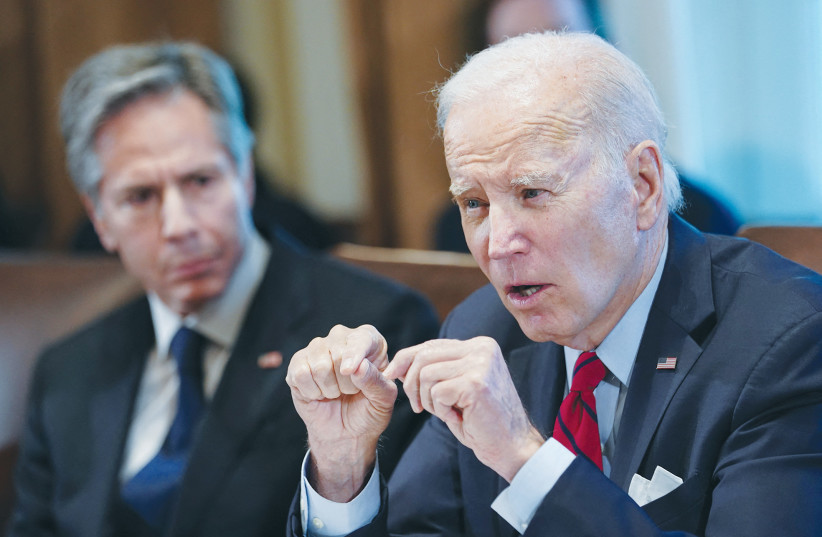From the Israeli perspective, the confrontation between Prime Minister Benjamin Netanyahu and Minister-without-Portfolio Benny Gantz over the latter’s visit to Washington is first and foremost a signal of potentially destructive disunity at the very top of government when heartwarming unity has been so prominent and necessary within society at this crucial time.
From the White House’s vantage point, however, the invitation extended to Gantz is packaged as a strategically timed move to maintain US backing for Israel in the war against Hamas while trying to somehow control the damage done domestically in the US to President Joe Biden. During the current presidential election campaign, criticism of his supportive policy toward Israel is reaching growing proportions and the political stakes mount.
According to a White House official, within the US diplomatic and defense echelon, support for Israel among the people closest to the president remains strong, even if Jerusalem and Washington may differ on which tactical moves to take at particular times. However, among the political staff involved in running the reelection campaign, there has been pressure.
A presidential aide stresses that Biden’s political team is not trying to get the president to stop supporting Israel. According to the aide, who is an adviser on diplomatic affairs, the campaign gurus see that the president is determined to continue working with Israel and that Secretary of State Antony Blinken, Defense Secretary Lloyd Austin, and National Security Advisor Jake Sullivan also believe that the administration’s current course in the Israel-Hamas war is the right way to proceed.
Countering perceptions of progressive members
However, when your boss is characterized by some critics as “Genocide Joe,” it’s going to shake you up, and the campaign team has been feeling the reverberations. In campaign brainstorming consultations, I am told, it was agreed among the experts on the Biden team that a way had to be found to counter the perception from within the Democratic Party and especially progressive members, that what Israel is doing is wrong and that the Israeli government is extreme.

Members of the Biden team were observing that the relationship with Netanyahu was getting singled out in the stinging criticism aimed at the president and his reelection effort. As one aide put it, “It’s one thing for a senator, someone like Bernie Sanders, to say that Netanyahu has to go, but when a voter interviewed on television outside a polling station in Michigan says that she voted ‘uncommitted’ in the [presidential] primary in order to stop Biden from helping Netanyahu – singling the prime minister out that way – that’s different.”
As a result, the political team’s strategy emerged as stressing the Gaza war as an issue of relations with Israel, a crucial ally, and not a Netanyahu issue. Gantz was their guy. After all, they noted, he is a member of the war cabinet but had been part of the opposition before the war and is not aligned with the more right-wing portion of the Israeli government. This would help the argument, the political aides hoped, that the war was against terror and not against Palestinians.
THE PRESIDENT’S POLLSTERS also follow polls in Israel and are aware that Gantz has gained popularity as someone who works to unify. It’s something that the Biden pollsters have followed not only now, I was told, but also during the judicial overhaul controversy in Israel, which preceded the war.
Today is Super Tuesday, a massive day in the presidential primary season. It was deemed a perfect week for a Gantz visit to Washington. It seemed quite clear that the president had already been pushing hard for a temporary ceasefire and hostage deal before Super Tuesday.
Advertising the Gantz visit as headlining a meeting with the vice president, but not the president himself, would maintain a framework that the objective of these talks is not about overstepping the bounds into another country’s internal affairs. Biden aides knew of the domestic tensions between Gantz and Netanyahu but also trusted that Gantz would act statesmanlike in Washington.
The objectives of US administration discussions with Gantz are the same as those with Netanyahu, according to the White House. “US policy doesn’t change dependent upon with whom among the Israelis we’re meeting,” an aide maintained.
However, by holding the talks with Gantz, the Americans were giving a spotlight to a different face of the Israeli leadership, a face that the White House hopes will have been more palatable to those who have been lashing out at the incumbent during the election campaign or at least to those supporters who are not sure about whether the president is doing the right thing regarding Israel.
When all is said and done, Biden needs to show progress toward resolving the Gaza crisis; he needs to show that working closely with Israel is the right policy; and this remains the current course, the White House insists.
AS FOR NETANYAHU himself, he has been in similar situations before. During his first term as prime minister (1996-1999), then-Egyptian president Hosni Mubarak made it clear that he preferred meeting with the then-Israeli defense minister, Yitzhak Mordechai. During those same years, Jordan’s King Hussein tried to evade a meeting with Netanyahu. When asked back then about various leaders preferring not to meet with him, Netanyahu replied, “I am prime minister, and there is only one prime minister.”
That was the same reaction we heard this past weekend from Netanyahu after the news emerged of Gantz’s impending visit to Washington. In the White House, aides say they hope Netanyahu will do whatever it takes to advance US-Israel cooperation toward achieving the goals of the Gaza war, even when that effort involves showing a different face of the Israeli leadership to the American electorate.
The writer is the op-ed editor of The Jerusalem Post.
